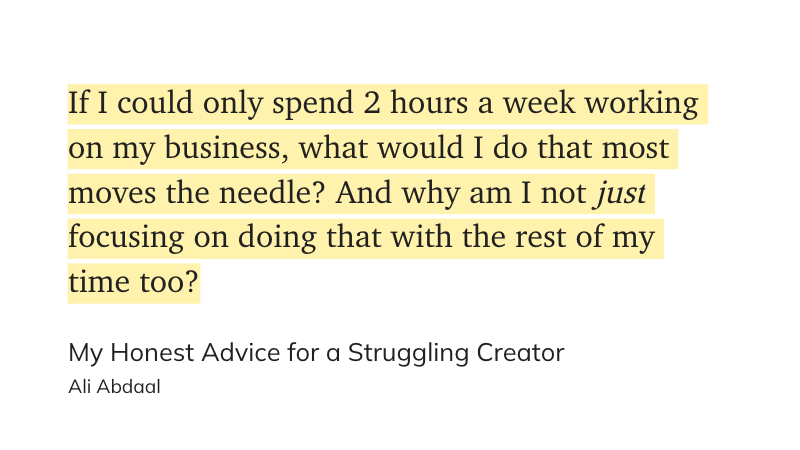Frontlines or Sidelines: Striking the Right Balance in Management
The balance between hands-on leadership and empowering your team.

Issue No. 24
As I build this newsletter (and a podcast and YouTube channel) in the open, you will get updates occasionally.
Inspiration for this week's post came from a friend's question. I intended to build up a library of answers to questions like this.
If you prefer this newsletter in podcast format, you can find it here or wherever you get your podcasts. There is also a video version on Spotify and YouTube. Your feedback is needed; this is an experiment, and I'm learning a lot from it.
One note: I've mentioned that part of my project is to launch a podcast and a YouTube channel. This is not it, but I'm using this to practice and learn (I hope you notice an improvement between the first video version and the second one).
This week's issue should be available in podcast format sometime over the weekend.
💬 In this issue, I cover:
- 🤹 Frontlines or Sidelines - Striking the Right Balance between active leadership and empowering your team.
- 🎯 Should Managers Be Better Than Their Team Members at the Job? - Managerial success isn't about outperforming your team but enabling them.
- 🏅 Coaching From the Sidelines - Embrace the role of a multiplier by aligning team efforts with business needs and fostering growth.
- 🛡️ Where should you lead from the front? - Lead by example in creating trust and modelling desired behaviours within your team.
- 🎬 Wrapping up - Avoid micromanagement by applying task-relevant maturity to guide your leadership style.
Frontlines or Sidelines: Striking the Right Balance in Management
A friend of mine asked me this question, and it's a good one:
"When should you take the lead on the frontline as a manager, and when should you coach from the sidelines while your team members do the work?"
Or, putting what he was asking me another way, should you, as a manager, also be the best individual contributor on the team?
In leadership and management, you should act as a multiplier, enabling your team rather than doing all the work yourself. So, let's look at this from a few angles.
Should Managers Be Better Than Their Team Members at the Job?
It certainly helps if you understand everyone's job and have done it before. Generally, people prefer it if their manager has some hands-on experience doing their job.
But should you be better at the job than your team members?
Interestingly, you might find it surprising that research shows the highest individual performers in a team can make the worst managers. Gallup's research shows that the best individual contributors are not necessarily good managers. Being a successful programmer, salesperson, or accountant is no guarantee that someone will be adept at managing others.
Great managers excel at motivating others, building relationships, and creating a culture of accountability, while top performers tend to be more focused on their own results.
A study by Gallup found that only 1 in 10 people possess the natural talent to manage others and that the best managers often have completely different strengths than the best individual contributors.
So, counterintuitively, if you try to be the best individual contributor while managing your team, things can backfire because it requires a focus on different aspects than what it takes to succeed as a manager.
Coaching From the Sidelines
To be a multiplier, you must mostly coach from the sidelines. That means:
- Enabling team members to do their best work.
- Making sure the team's work is aligned with what the business needs.
- Having people work together in a team and facilitating their work.
- Removing blockers for team members (including coaching them to remove their internal blockers).
- Enabling team members to grow.
One of the keys to leading from behind is for you to explain what good looks like and ensure that your team understands their roles, responsibilities, boundaries, and the space in which they can operate.
Think about it like a football team. Everyone knows their position, what they're supposed to do in that position, what good looks like, and how they behave in certain moments within the game. They know where to stand on the pitch for a free kick or a corner.
How Close Should the Sidelines Be From the Players?
One challenge is calibrating the distance you maintain when managing someone.
You should calibrate your involvement based on the team member's competence and autonomy for different tasks.
The concept of task-relevant maturity can help here. Andy Grove, the former CEO of Intel, wrote about it in his book High-Performance Management.
You need to understand your team members' level of competence and understanding of a task. It may be that you can tell someone, "I think we need to go over there", and then they can autonomously go over there and get there, and for other people, you need to hold their hand and go with them. So there's a spectrum, and you need to understand where someone is on that spectrum. Task relevance maturity tends to vary from task to task. Your goal should be to help your team members become autonomous.
Where should you lead from the front?
Managers are facilitators of a positive work culture, so there are areas where managers should take the lead.
Leaders Need to Lead From the Front When Creating Trust Inside the Team
Creating psychological safety and trust inside the team is one of the most important things leaders should do, and I think leaders have a specific power to do that (or to kill it).
Leaders Need to Model the Behaviour They Want to See in the Team
Good leaders model the behaviour they want to see in the team. For example, if you want people to attend meetings on time, be on time.
More importantly than modelling meeting punctuality, leaders should model transparency, self-understanding, empathy, feedback and communication.
Leaders Lead by Putting on Their Own Oxygen Mask First
Leading from the front also means taking care of yourself. Consider the aeroplane safety instructions to put on your oxygen mask before assisting others. You won't have credibility if you're a burnt-out human mess attempting to direct others towards orderliness.
Wrapping up
So, there are moments when you should lead from the front, but if you dive in and try to do everything for everyone, you risk becoming a micromanager, which can lead to disaster.
It's a delicate balance, but knowing where I should always lead from the front and when I should adjust my style helps.
The concept I mentioned of task-relevant maturity helps me in many situations when working with someone. I keep coming back to it because it's so useful.
🔦 Highlight of the Week
This week's quote comes from Ali Abdaal's newsletter; it hit home hard for me; maybe this prompt can be relevant for you, too?

💬 If you had some thoughts while reading this, I would love to hear them in the comments.



